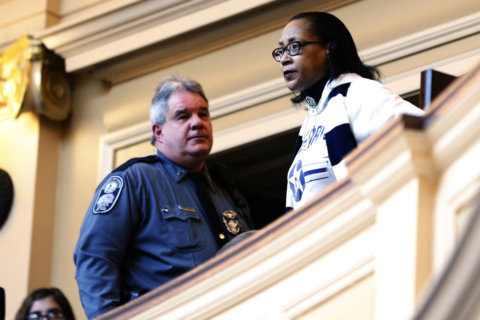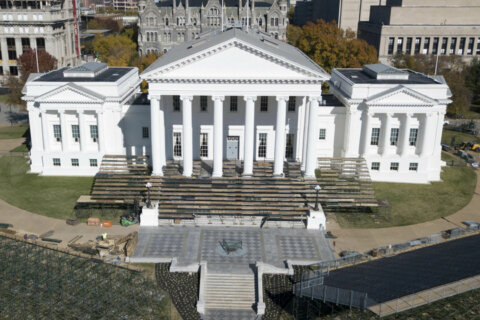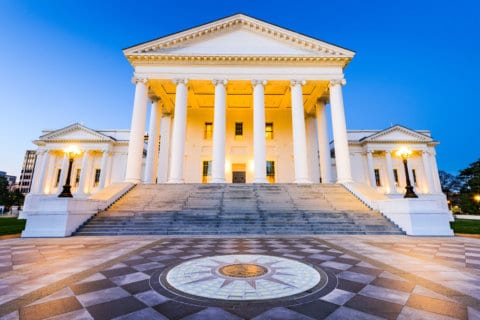RICHMOND — Virginia’s General Assembly session could be forced into
overtime due to delays in finalizing a budget deal, even as other bills from Interstate 81 to tampon taxes have already been sent to the governor.
On the budget, House and Senate leaders got stuck on how to structure higher education funding including college financial aid or money to limit tuition increases. That prevented a budget deal from reaching the floor Thursday or Friday, which means the General Assembly would have to remain in session into at least Sunday in order to follow a rule requiring 48 hours for the budget to be read and reviewed before a vote.
That rule can be waived, and lawmakers had mixed expectations on whether the session would end as scheduled on Saturday.
The House and Senate budgets did not have as many significant differences this year as they have at some points in the past, such as last year’s standoff over Medicaid expansion that required a special session. Both budgets stripped out spending proposed by the governor after a tax bill was signed into law that aims to offset state tax increases tied to the federal Republican tax cut.
Scandals status
The General Assembly is set to leave Richmond without taking any action on the scandals surrounding the state’s top leaders.
The largest back-and-forth Thursday and Friday was tied to the sexual assault accusations against Lt. Gov. Justin Fairfax that he flatly denies.
House Democrats and Republicans had been talking about how to have a bipartisan committee hear the two accusations from 15 to 20 years ago, but Republicans Friday unilaterally announced a plan for the GOP-led Courts of Justice Committee to hold a meeting at some to-be-determined point in the future where Fairfax, Meredith Watson and Dr. Vanessa Tyson would be invited to testify. It is not clear if there would be additional investigation.
They can schedule and hold meetings even outside of session.
While Watson welcomed the announcement in a statement from her lawyer, Tyson was more skeptical of it being purely political. Both do want to speak publicly.
Democrats continue to request details of any committee process, since it is unclear what the outcome of a hearing would be.
The House does have impeachment powers, but the actions at issue happened outside of the state and well before Fairfax’s time in office.
While many Democrats stood behind a powerful floor speech from Del. Lashrecse Aird saying the General Assembly cannot provide justice, and a Boston-area prosecutor’s investigation into Tyson’s claims should be allowed to run its course, Del. Lee Carter of Manassas spoke against that position on the House floor, citing his own experience as a victim of a sexual assault, exposing some splits in the caucus.
Interstate 81
To the consternation of many lawmakers, a final I-81 improvement bill included no funding for actual fixes.
A bipartisan group, including Gov. Ralph Northam, announced support earlier in the session for a tolling plan to pay for more than $2 billion in prioritized improvements identified in a study last year.
Other proposals introduced or floated in the session included statewide gas and diesel tax increases, raising only the tax on diesel to the average of surrounding states, or increasing certain truck registration fees.
Instead, the final bill sent to Northam essentially would just continue last year’s study. It also creates an account that could hold future funding.
In addition to concerns from the trucking industry, manufacturers and others about various proposals, some lawmakers from outside the I-81 corridor had concerns about the tolling plans or about taking action that would not address broader statewide transportation needs.
If an agreement on funding were to be reached over the next few weeks, Northam could offer it as an amendment to the bill that the General Assembly would then take up at April’s one-day reconvened session that addresses any vetoes or amendments from the governor.
Tampon tax
The House and Senate agreed Friday to reduce the sales tax on personal hygiene products, also known as the “tampon tax,” to 1.5 percent.
The bill defines “essential personal hygiene products” that qualify for the reduced sales tax as “diapers, disposable undergarments, pads, and bed sheets; and … menstrual cups and pads, panty liners, sanitary napkins, tampons, and other products used to absorb or contain menstrual flow.”
Other bills sent to governor
Lawmakers also reached agreements on differences between House and Senate versions of bills on a number of other issues:
- Standards to be set for school resource officer training
- Expansion of Virginia’s ‘revenge porn’ statute to cover videos and images that have been edited to appear that they are a person being targeted by the act
- Tougher penalties for cruelty to animals
- Expanding Sunday alcohol sales hours to 10 a.m. at certain ABC stores, and changing payments to distillers
- Expanding permission for places such as Loudoun County to have more parking
enforcement - A requirement that state elections officials check voter registration information against Social Security or other databases by 2021
- Significant changes to the State Board of Elections and Department of Elections leadership, including a reduction of power for the governor
- A bill ensuring Stafford County, Spotsylvania County and Fredericksburg City Schools can all start on the same day in August
While Northam is expected to sign some of the bills, he is likely to reject others, including at least aspects of the elections bills.
Northam has no plans to resign over his admission of once wearing blackface.
He met Friday morning at the Executive Mansion with four members of the “Richmond 34”, civil rights sit-in heroes honored Thursday at a Virginia Union University event he skipped on request of current student leaders. The group was then honored on the House floor.
What we’re waiting on
Besides the budget, there are a number of other key bills that remain unresolved.
Small differences on a bill that would ban handheld cellphone use while driving have not been ironed out, which has raised concerns from some advocates about whether the bill could fade away Saturday.
The General Assembly is also still working on how to study gambling in the state, and whether such a study should be focused only on specific locations where there has been interest in building casinos.
One of the most significant outstanding issues is redistricting reform, with competing versions of state constitutional amendments from the House and Senate.
The Senate version, advocates said, would lead to more truly nonpartisan redistricting while the House version would keep legislators more involved.
While the next redistricting is not until 2021, following next year’s census, constitutional amendments in Virginia must be approved by the General Assembly in two separate years with an intervening election, so if an amendment is not approved this year and next to go to voters in November 2020, it would not be effective for the upcoming maps.
The final week of the session has included a significant amount of time spent on issues meant to fire up supporters for this fall’s elections.
House Democrats forced votes that led to House Republicans blocking the Equal Rights Amendment, and Republicans have repeatedly brought up abortion on the floor, for example.









